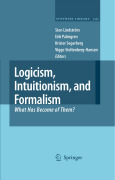
Logicism, intuitionism, and formalism: what has become of them?
Lindström, S.
Palmgren, E.
Segerberg, K.
Stoltenberg-Hansen, V.
The purpose of this anthology is to review the programmes in the foundations of mathematics from the classical period and to assess their possible relevance for contemporary philosophy of mathematics. What can we say, in retrospect, about the various foundational programmes of the classical period and the disputes that took place between them? To what extent do the classical programmes of logicism, intuitionism and formalism represent options that are still alivetoday? A special section is concerned with constructive mathematics and its foundations. This active branch of mathematics is a direct legacy of Brouwer’s intuitionism. Today one often views it more abstractly as mathematics based onintuitionistic logic. It can then be regarded as a generalisation of classical mathematics in that it may be given, firstly, the standard set-theoretic interpretation, secondly, algorithmic meaning, and thirdly, nonstandard interpretations in terms of variable sets (sheaves over topological spaces). Contains essays by world-leading experts in the philosophy and foundations of mathematics, describing current developments in the foundations of mathematics in a historical perspective Analyses the classical philosophical and foundational viewsof Frege, Brouwer, Hilbert, Gödel and Tarski and examines their relevance forcurrent developments Provides an in-depth analysis of various kinds of neologicist philosophies of mathematics INDICE: From the contents Preface. Notes On The Contributors. Introduction.- I. Logicism And Neo-Logicism.- II. Intuitionism And Constructive Mathematics.- III. Formalism.- Index.
- ISBN: 978-1-4020-8925-1
- Editorial: Springer
- Encuadernacion: Cartoné
- Páginas: 525
- Fecha Publicación: 01/01/2009
- Nº Volúmenes: 1
- Idioma: Inglés
